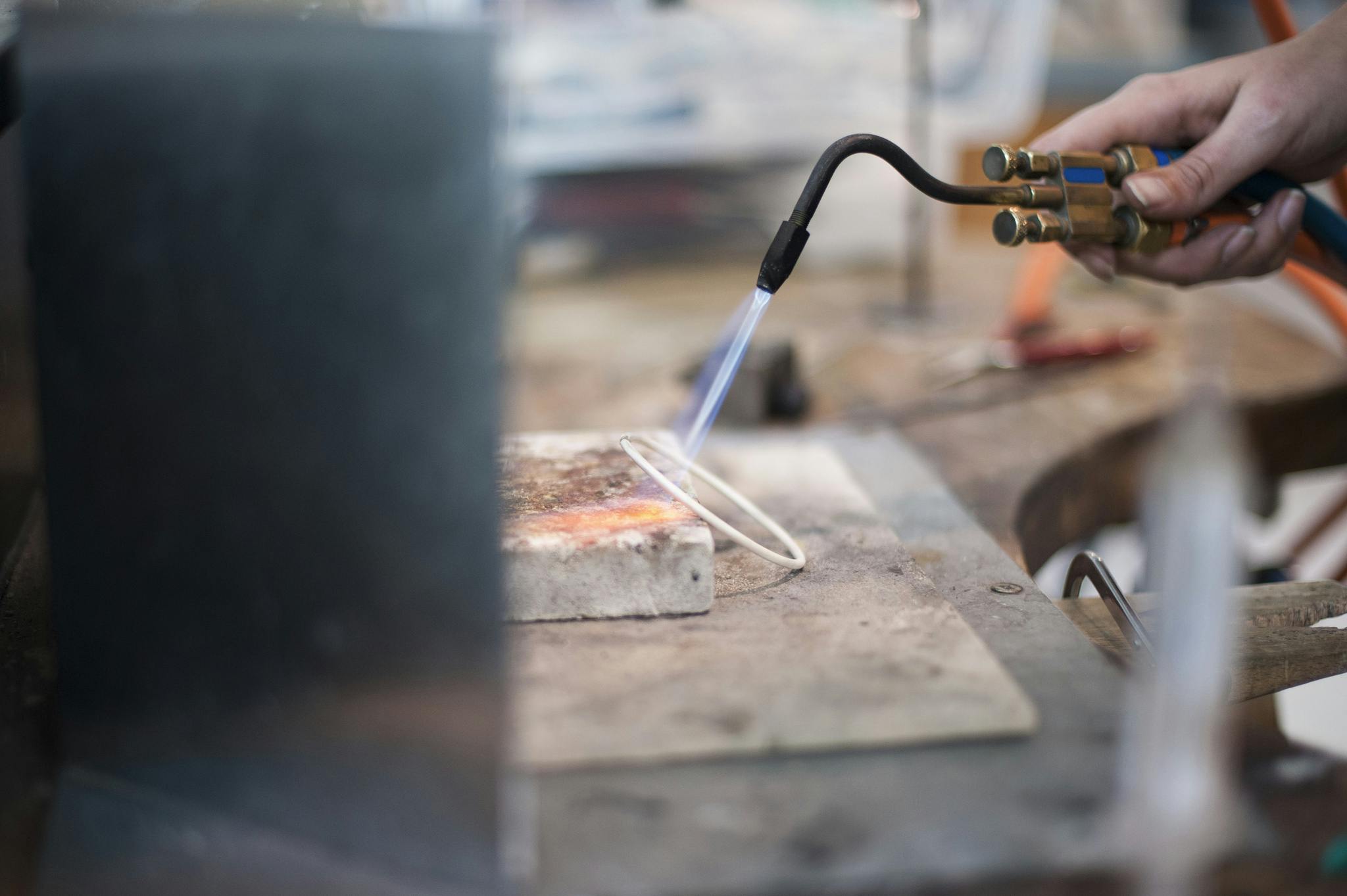Our Resources
Material Lab
In the Material Lab you will be encouraged to acquire haptic – touch-based – and manipulative skills and gain an understanding of material properties.
<p>In the Material Lab you will be encouraged to acquire haptic – touch-based – and manipulative skills and gain an understanding of material properties. Some components of the Material Lab are based in our £8m Craft, Design and Fabrication workshops, <a href="https://www.plymouthart.ac.uk/blog/in-pictures">formally opened by Sir John Sorrell in November 2014</a>, including our Glass-blowing house, our Ceramics space, our Metals workshop, and our Plaster room.</p>
<p><strong>Ceramics - </strong>Our open-plan, spacious Ceramics Studio has large windows providing plenty of natural light to work in. The slip casting area consists of four custom made slip-casting tables, a slip-blunger and storage shelves for moulds. The hand-building area consists of 4 large tables where all group teaching takes place. We have extruders, a sandblaster, a hydraulic tile press and storage areas for work in progress and materials. The studio is also equipped with 10 potters wheels, a wedging table, a clay recycling area, and a second group teaching area and space for large scale building. In addition, the adjoining rooms related to ceramics are the kiln room (which contains 15 electric kilns and a large gas kiln), the glaze room, the plaster room, the materials shop and the outdoor dedicated Raku shed. Our Raku facility is unique for an arts university in an urban city-centre location, it's a great place for experimental firings and many of our students enjoy the Raku process and it is often the first thing the ceramics specialists want to do!</p>
<p>One of the key skills of ceramics is glazing, our well-stocked dedicated glaze room means students can experiment and produce glazes for their ceramics, gaining a wider understanding of the medium. <strong><br /></strong></p>
<p>Our Plaster Room is where we deliver all of the plaster mould making sessions related to ceramics and glass. The room is equipped with 2 plaster lathes, a downdraft and an updraft extraction unit, wax and gel flex melting machines, a wax steaming area and mould making benches.</p>
It's rare for institutions to have a glaze room or area to study glazing techniques. Ours is a very well equipped room that allows students to explore ceramic technology in depth.
Maria Psiliagkou, Workshop Coordinator
Ceramics – Facilities include provision for throwing, raku, tile press, glazing, slip casting, hand-building and a large kiln room.
Glass – There are four main areas in glass: hot glass with two glory holes and furnace, cold working and finishing, lamp-working and kiln forming.
Plaster – The plaster room allows access to mould-making and casting in a wide range of materials.
<p><strong>Glass - </strong>This purpose-built, spacious and light workshop is dedicated to the teaching of hot glass processes. Students are inducted into the glass blowing studio, learning how to gather hot glass from the furnace and shape it with traditional glassmaking tools. Hot glass blowing is part of the BA (Hons) Craft & Material Practices course, interested students are given a taster and once they choose to specialise are taught specific techniques for form building within the hot glass studio, with time to practice. Arts University Plymouth is the only degree course in the South West offering these facilities.</p>
<p> "We are so lucky to have a specialist hot glass studio. This is a traditional craft that takes time to master, students are able to come here and practice this in a safe and spacious environment with expert specialist delivery from staff." - Amy Whittingham, Workshop Coordinator</p>
<p>The Cold Working Area is packed with top of the range machinery for glass finishing, from sawing and lathe work surface decoration, including lathe and hand engraving and sandblasting, through to drilling holes, grinding and polishing. The workshop houses: two Glass Diamond blade saws, three Bohle flat bed grinders at 80, 120 and 180 grits, two Bohle linishers (wet belt sanders) for grinding and polishing, Batiste lathe for grinding and polishing, small Covington grinder with magnetic disks for polishing, a Covington reciprolap machine, Kurt Merker engraving lathe, two handheld engravers, a glass drill. Large Guyson sandblasting unit. Arts University Plymouth is the only degree course in the South West offering these facilities.</p>
<p><strong>Metals –</strong> Our metalwork room consists of a welding room with extraction that contains a powerful Mig welder, plasma cutter, two oxy-acetylene gas welding torches, brazing and heating stations, 24 soldering stations, industry-standard vacuum metal casting, electroforming, enamelling kilns, hydraulic press-forming, micro-scale welding, as well as an anvil, swage block, vices and metalwork tables. There is also an additional room for grinding and other finishing processes for metals.</p>
<p>This studio is well equipped and enables students to work on metal from small, through medium to large scale.<br /></p>
<p><strong>3D Wood and Plastics – </strong>Catering to a variety of different skill sets, the 3D Wood and Plastics workshop is open to all students across a multitude of creative disciplines. Create almost anything, from CNC machined plywood furniture to bespoke stretchers and substrates for painting or from a turned wooden bowl to a vacuum-formed costume mask.<br /><br />The workshop is equipped with a steam bending box, lamination bag press, vacuum former, bandsaw, belt and disc sander, sanding table, mitre saw, hot wire cutter, bobbin sander, pillar drill, plenty of hand tools and a designated spray painting room.</p>
It’s really great that Arts University Plymouth enables and encourages hands-on work with industrial equipment. I have seen amazing results and great confidence boosts from students who have gone on to learn how to weld and plasma cut.
Noah Taylor, Workshop Coordinator
Crafts student Benjamin Lintell shares a glimpse into his creative practice working with glass.
